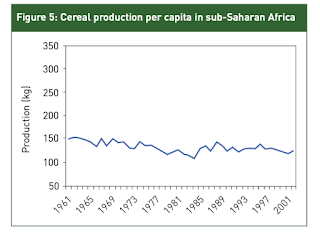The North South Division
After having a group discussion in the lecture this week, I realize I’ve been focusing the attention of my blog on mostly Sub Saharan African countries and their connections to food and water. As I’ve just done a case study on a southeastern country in Africa, Mozambique, I will focus this week's attention on farming, agriculture, and water use in Northern Africa. I will follow this blog post with a case study on a Northern African country in order to balance my thoughts and deliver a more well-rounded image of food and water in Africa. Map showing the region of Northern Africa (Ethnologue) The first thing that caught my mind when reading about agriculture in Northern Africa, is that every paper mentioned semi-urban practices. One in particular mentioned feedlots (FAO) , “Livestock, mainly sheep and goats, are an important feature of many farming systems...from extensive pastoralism to feedlots in peri-urban agriculture,” this immediately shows a stark difference between Nor
